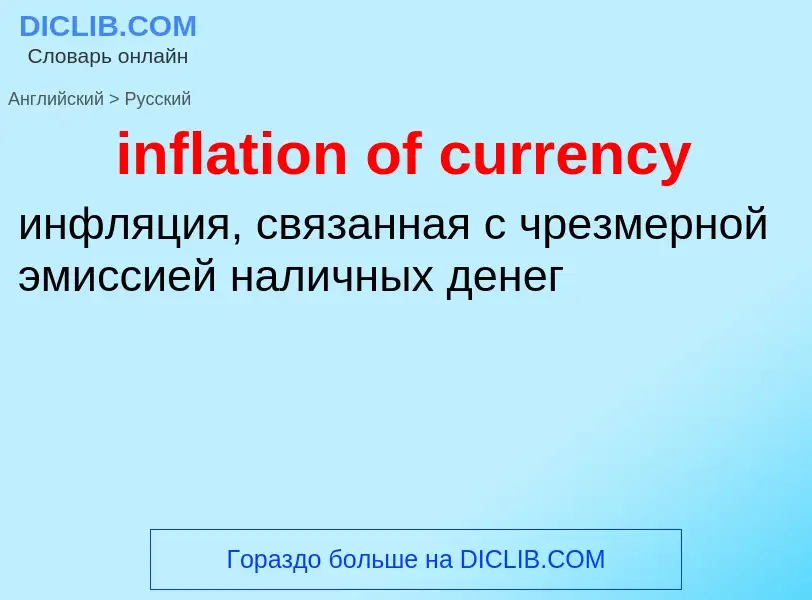Μετάφραση και ανάλυση λέξεων από την τεχνητή νοημοσύνη ChatGPT
Σε αυτήν τη σελίδα μπορείτε να λάβετε μια λεπτομερή ανάλυση μιας λέξης ή μιας φράσης, η οποία δημιουργήθηκε χρησιμοποιώντας το ChatGPT, την καλύτερη τεχνολογία τεχνητής νοημοσύνης μέχρι σήμερα:
- πώς χρησιμοποιείται η λέξη
- συχνότητα χρήσης
- χρησιμοποιείται πιο συχνά στον προφορικό ή γραπτό λόγο
- επιλογές μετάφρασης λέξεων
- παραδείγματα χρήσης (πολλές φράσεις με μετάφραση)
- ετυμολογία
inflation of currency - translation to ρωσικά
Ορισμός
.
Βικιπαίδεια
In economics, inflation is an increase in the general price level of goods and services in an economy. When the general price level rises, each unit of currency buys fewer goods and services; consequently, inflation corresponds to a reduction in the purchasing power of money. The opposite of inflation is deflation, a decrease in the general price level of goods and services. The common measure of inflation is the inflation rate, the annualized percentage change in a general price index. As prices faced by households do not all increase at the same rate, the consumer price index (CPI) is often used for this purpose. The employment cost index is also used for wages in the United States.
Most economists agree that high levels of inflation as well as hyperinflation—which have severely disruptive effects on the real economy—are caused by persistent excessive growth in the money supply. Views on low to moderate rates of inflation are more varied. Low or moderate inflation may be attributed to fluctuations in real demand for goods and services, or changes in available supplies such as during scarcities. Moderate inflation affects economies in both positive and negative ways. The negative effects would include an increase in the opportunity cost of holding money, uncertainty over future inflation, which may discourage investment and savings, and if inflation were rapid enough, shortages of goods as consumers begin hoarding out of concern that prices will increase in the future. Positive effects include reducing unemployment due to nominal wage rigidity, allowing the central bank greater freedom in carrying out monetary policy, encouraging loans and investment instead of money hoarding, and avoiding the inefficiencies associated with deflation.
Today, most economists favour a low and steady rate of inflation. Low (as opposed to zero or negative) inflation reduces the probability of economic recessions by enabling the labor market to adjust more quickly in a downturn and reduces the risk that a liquidity trap prevents monetary policy from stabilizing the economy, while avoiding the costs associated with high inflation. The task of keeping the rate of inflation low and stable is usually given to monetary authorities. Generally, these monetary authorities are the central banks that control monetary policy through the setting of interest rates, by carrying out open market operations and (more rarely) changing commercial bank reserve requirements.

![M2 money supply]] increases Year/Year}}
M2 money supply]] increases Year/Year}}](https://commons.wikimedia.org/wiki/Special:FilePath/CPI 1914-2022.webp?width=200)




![krona]] gold coins from the [[Scandinavian Monetary Union]], a historical example of an international gold standard krona]] gold coins from the [[Scandinavian Monetary Union]], a historical example of an international gold standard](https://commons.wikimedia.org/wiki/Special:FilePath/Two 20kr gold coins.png?width=200)

![Inflation rates among members of the [[International Monetary Fund]] in October 2022. Inflation rates among members of the [[International Monetary Fund]] in October 2022.](https://commons.wikimedia.org/wiki/Special:FilePath/World inflation rate October 2022.png?width=200)
